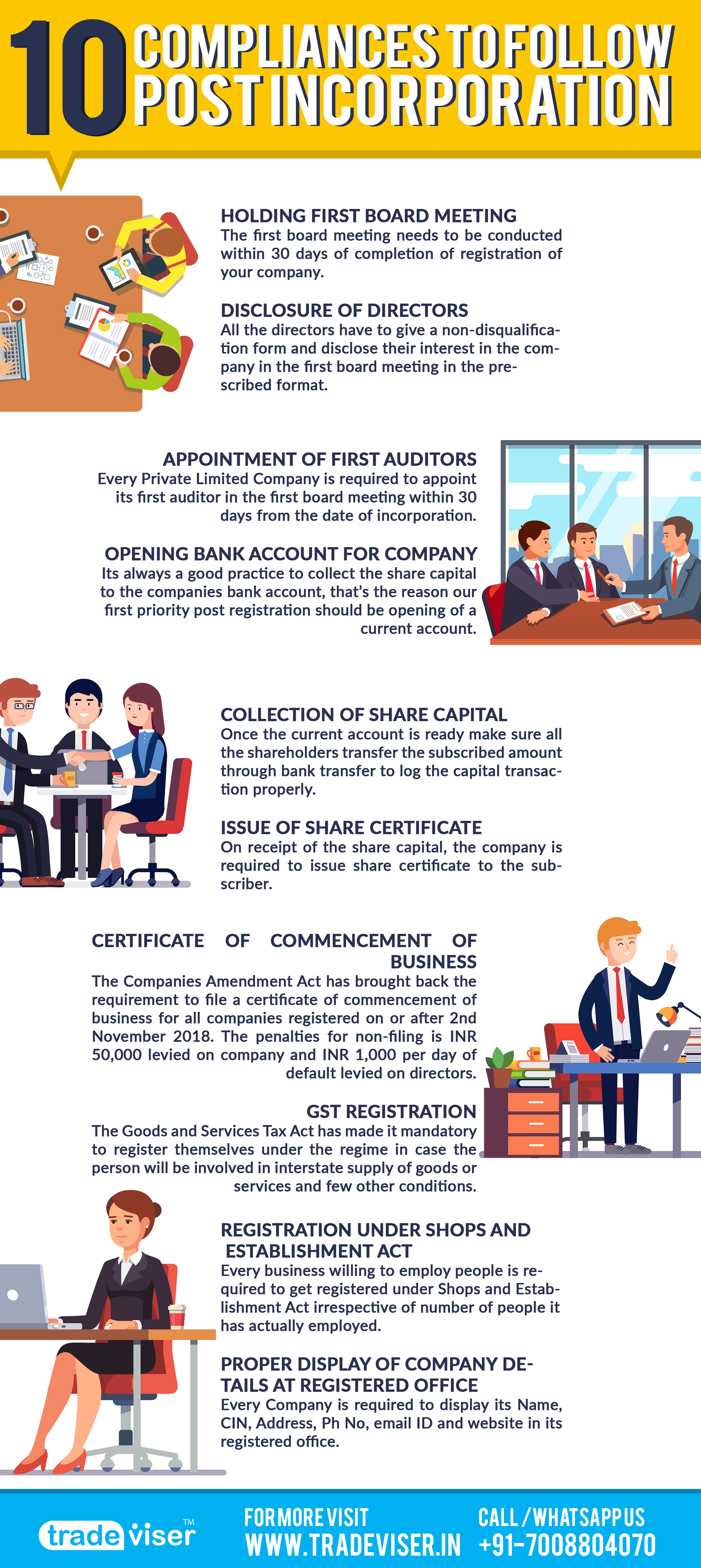10 Compliance to Follow Post Incorporation of Your Company
Congratulations, you’ve got your certificate of incorporation and are now all set to launch your product or service in the market. But let the joy of starting a new venture not make you forget to stay compliant with laws and regulations. Every company, once registered should always keep itself compliant to make sure the business and its functions don’t get affected, so here we have compiled a list of compliance a freshly incorporated startup needs to comply with.

-
Holding First Board Meeting
The first board meeting needs to be conducted within 30 days of completion of registration of your company. This provision is not mandatory for One Person Company since they generally have solo directors but the activities to be undertaken in the first board meeting such as auditor appointment, have to be complied with, even if you are a one-person company.
-
Disclosure Of Directors
All the directors have to give a non-disqualification form and disclose their interest in the company in the first board meeting in the prescribed format.
-
Appointment Of First Auditors
Every Private Limited Company is required to appoint its first auditor in the first board meeting within 30 days from the date of incorporation.
-
Opening Current Account For Company
Since the company needs to collect the subscribed share capital from the shareholders after registration of the company, and it’s always a good practice to collect the share capital to the companies bank account, that’s the reason our first priority post-registration should be opening of a current account.
A simple Board Resolution has to be passed along with basic documents of the company such as a certificate of incorporation, company PAN, etc for the opening of a current account.
-
Collection Of Share Capital To The Company Bank Account
Once the current account is ready to make sure all the shareholders transfer the subscribed amount through bank transfer to log the capital transaction properly.
-
Issue Of Share Certificate To The Share Holders
On receipt of the share capital, the company is required to issue a share certificate to the subscriber. Make sure the Share Certificates are issued within 60 days of incorporation of the company and are in a prescribed format and properly stamped.
-
GST Registration
The Goods and Services Tax Act has made it mandatory to register themselves under the regime in case the person will be involved in the interstate supply of goods or services and a few other conditions. Its always recommended getting your GST registration as a best business practice.
-
Registration Under Shops and Establishment Act
Every business willing to employ people is required to get registered under the Shops and Establishment Act irrespective of the number of people it has actually employed. This is a pretty simple registration, non- compliance of which may prove to be a costly affair in the long run
-
Proper Display Of Company Details At Registered Office
Every Company is required to display its Name, Corporate Identification Number, Address, Phone Number, Email ID, and website in its registered office and every such place it carries on its business. Business registered under GST and Shops and Establishment Act are also required to keep in proper display their registration number and registration certificates at their workplace.
-
Certificate of Commencement of Business
The Companies Amendment Act has brought back the requirement to file a certificate of commencement of business for all companies registered on or after 2nd November 2018. The penalties for non-filing is INR 50,000 levied on the company and INR 1,000 per day of default levied on directors.
For more assistance in Compliance please click here.
Published: 18-04-2018
Updated: 07-02-2019
Receive This Information In Your Inbox
Corporate Law Practitioner, Working On Rewiring The Compliance Industry, Founder & CEO of Tradeviser.in, I blend my background in Chartered Accountancy with a passion for brand strategy and design. From launching Odishas first English lifestyle magazine to building a platform that has empowered 2,000+ businesses, I’m driven to simplify compliance and help startups grow with confidence.


